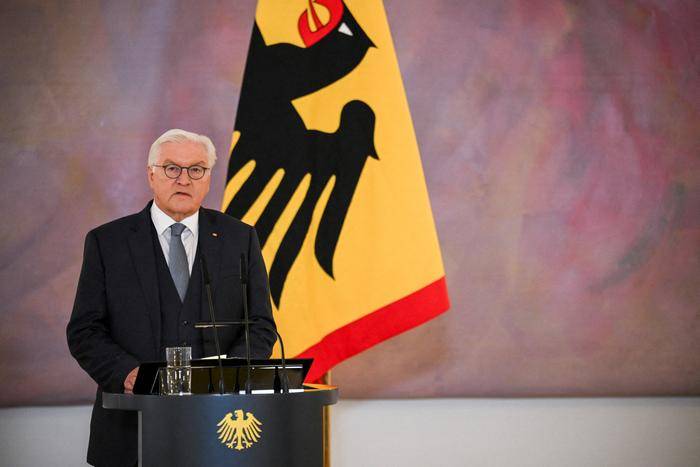Germany Braces for Snap Election as President Prepares to Dissolve Parliament
Germany is on the cusp of a pivotal moment in its political landscape, as President Frank-Walter Steinmeier is expected to dissolve the Bundestag, paving the way for a snap election on February 23, 2025. This development comes after the collapse of the ruling traffic light coalition, led by Chancellor Olaf Scholz, in the wake of a government crisis ¹.
The crisis began when Christian Lindner, the leader of the Free Democratic Party (FDP), was dismissed from the government by Scholz on November 6, 2024. This move triggered the collapse of the coalition, leaving the government without a majority. Scholz subsequently announced that he would submit a motion of confidence to the Bundestag, which is expected to be brought to a vote on December 16, 2024 ¹.
If the Bundestag does not give Scholz a majority vote of confidence, he can propose a dissolution of the Bundestag to President Steinmeier. While the President is not obliged to grant this request, it is likely that he will do so, given the current political climate. The governing parties and the opposition CDU/CSU have already agreed to recommend February 23, 2025, as the date for the snap election ¹.
The upcoming election is expected to be a crucial test for Germany's political parties, with the CDU/CSU, SPD, Greens, FDP, and AfD all vying for power. The campaign is likely to focus on key issues such as the economy, climate change, and migration.
- _Olaf Scholz_: The incumbent Chancellor and leader of the SPD, who will be seeking re-election.
- _Friedrich Merz_: The leader of the CDU/CSU, who will be challenging Scholz for the chancellorship.
- _Robert Habeck_: The co-leader of the Greens, who will be running for chancellor alongside Annalena Baerbock.
- _Christian Lindner_: The leader of the FDP, who will be seeking to capitalize on his party's strong performance in recent state elections.
Germany's electoral system is a mixed-member proportional system, in which voters have two votes: one for a candidate in their constituency and one for a party's electoral list. To enter the Bundestag, a party must either win 5% of the nationwide second vote or the most votes in three constituencies ¹.
The election will be a significant test for Germany's political parties, and the outcome will have important implications for the country's future direction. As the campaign heats up, voters will be closely watching the debates and policy proposals put forward by the various parties.




No comments yet
Be the first to share your thoughts!